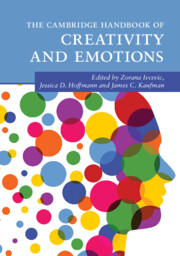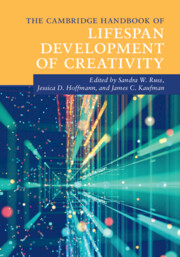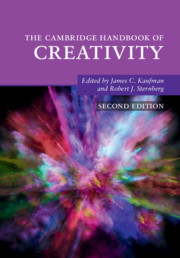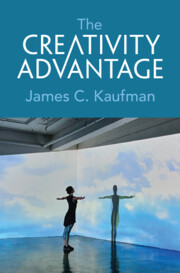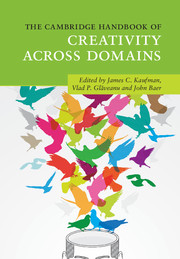The Cambridge Handbook of Creativity and Emotions
$69.99 USD
Part of Cambridge Handbooks in Psychology
- Editors:
- Zorana Ivcevic, Yale University, Connecticut
- Jessica D. Hoffmann, Yale University, Connecticut
- James C. Kaufman, University of Connecticut
- Date Published: February 2023
- availability: This ISBN is for an eBook version which is distributed on our behalf by a third party.
- format: Adobe eBook Reader
- isbn: 9781009032841
Find out more about Cambridge eBooks
$
69.99 USD
Adobe eBook Reader
Other available formats:
Hardback, Paperback
Looking for an inspection copy?
This title is not currently available on inspection
-
The Cambridge Handbook of Creativity and Emotions provides a state-of-the-art review of research on the role of emotions in creativity. This volume presents the insights and perspectives of sixty creativity scholars from thirteen countries who span multiple disciplines, including developmental, social, and personality psychology; industrial and organizational psychology; neuroscience; education; art therapy, and sociology. It discusses affective processes – emotion states, traits, and emotion abilities – in relation to the creative process, person, and product, as well as two major contexts for expression of creativity: school, and work. It is a go-to source for scholars who need to enhance their understanding of a specific topic relating to creativity and emotion, and it provides students and researchers with a comprehensive introduction to creativity and emotion broadly.
Read more- Offers state of the art review of existing research and proposes crucial directions for future research
- Includes contributions from leading scholars in multiple disciplines, including development, social, and personality psychology; industrial and organizational psychology; neuroscience; education; art therapy, and sociology
- Proposes new theoretical models stimulating scholarship
Reviews & endorsements
'This handbook is a must read to anyone seeking the most comprehensive reference to date on the topic of creativity and emotions. It offers an outstanding coverage of the key issues on the topic, and a stunning demonstration of the complementarity of perspectives, by leaders in this field.' Baptiste Barbot, Université Catholique de Louvain, Belgium
See more reviews'A creative process is an emotional roller-coaster. The Cambridge Handbook of Creativity and Emotions will take you on a long ride through the scientific study of creative persons in several contexts, including school and work, while contemplating their related affective, emotional and motivational states and abilities. Enjoy the ride!' Giovanni Emanuele Corazza, University of Bologna, Italy
'Like all good handbooks, The Cambridge Handbook of Creativity and Emotions pulls together world-class researchers who are at the cutting edge of a field of study (creativity and emotion) that is lacking a high-level summary of what the field is about and why it is important. This book fills that void.' Gregory J. Feist, San Jose State University, USA
'A delightful read for anyone interested in uncovering a different and often overlooked side of creativity - its deep connection to emotion and to human ways of experiencing the world. Comprehensive in its coverage and accessible in its approach, this handbook is set to become an essential resource for creativity and emotion researchers alike.' Vlad P. Glaveanu, Webster University Geneva, Switzerland and University of Bergen, Norway
'Emotions offer an essential key to unlock the mysteries of creativity. This handbook provides an up-to-date view, examining person-centered, process-centered, developmental, and methodological issues in a wide range of contexts. For a 360-degree vantage point on the emotion-creativity connection, this Handbook is a must see.' Todd Lubart, Professor of Psychology, Université Paris Cité, France and President of ISSCI, International Society for the Study of Creativity and Innovation
'The conventional wisdom is that the important topic of affect and creativity is understudied. This Handbook provides convincing evidence the conventional wisdom as it involves emotion and creativity is not only wrong, but wildly so. Both basic and applied creativity research involving emotion is thriving, and the handbook's impressive mix of scholars and practitioners from around the world provide insights about studying emotions and creativity, how emotions influence the creativity process across several domains, and how emotions interact with other affective constructs to influence and be influenced by creativity, among many other topics. Anyone studying emotions and creativity or applying this research to practice should keep this handbook within easy reach.' Jonathan A. Plucker, Julian C. Stanley Professor of Talent Development, John Hopkins University, USA
'For decades, investigators have explored the connection between emotional experience and creativity. How do our emotions inform the creative process? How do they help us to appreciate others' creativity? In the first and only handbook of its kind, Ivcevic, Hoffman, and Kaufman have collected together well-rendered essays addressing these and other questions from fields as diverse as affective neuroscience, child development, and personality psychology. An excellent resource!' Peter Salovey, Chris Argyris Professor of Psychology and President of Yale University, Yale University, USA
'This handbook brings together the leading scholars worldwide on the study of the relationship between creativity and emotions. It is written in a way that researchers not only in psychology, but in other fields studying creativity, can understand. It brilliantly covers the gamut of topics in this field, and masterfully presents information about creativity and emotion that will make it an indispensable guide to anyone who wants to understand why they, or others, can feel so very creative one day and yet barren of creative ideas the next.' Robert J. Sternberg, Professor, Cornell University, USA and University of Heidelberg, Germany
'Even readers who consider themselves familiar with the creativity literature will find hitherto overlooked materials in this compendium, and those who are well read on the topic of emotions will discover material to broaden and deepen their knowledge.' S. Krippner, Choice
Customer reviews
Not yet reviewed
Be the first to review
Review was not posted due to profanity
×Product details
- Date Published: February 2023
- format: Adobe eBook Reader
- isbn: 9781009032841
- availability: This ISBN is for an eBook version which is distributed on our behalf by a third party.
Table of Contents
Creativity and emotions: Introduction Zorana Ivcevic, James C. Kaufman, Jessica D. Hoffmann, Shengjie Lin
Part I. Methods in the Study of Creativity and Emotions:
1. Experimental methods in the study of emotions and creativity Matthijs Baas
2. Affect, complexity, and the case study method Michael Hanchett Hanson, Joseph I. Eisman and Jennifer Ruth Hoyden
3. Observational methods in the study of creativity and emotions Jen Katz-Buonincontro
4. Assessing creativity and affect in everyday environments: experience-sampling and daily diary methods Katherine N. Cotter
Part II. The Development of Creativity:
5. Affective states and creativity Hector Madrid, Malcolm Patterson and Miguel Ibaceta
6. The neuroscience of creativity and emotions Evangelia G. Chrysikou, Alexandra E. Kelly and Indre Viskontas
7. Attention, affect, and creativity, from mindfulness to mind-wandering Stephanie J. Kane, Kimberly Awa, Joshua D. Upshaw, Kent Hubert, Carl E. Stevens, Jr. and Darya Zabelina
8. Motivations, emotions, and creativity Marie Forgeard
9. Managing difference and uncertainty and creativity Tingshu Liu and Rodica Ioana Damian
10. Creativity and emotional intelligence: a complementary pairing Jessica D. Hoffmann and Sean McFarland
11. Emotions across the creative process and across domains of creativity Marion Botella
Part III. Emotions and the Creative Person:
12. Emotion traits and creativity Zorana Ivcevic
13. Gender differences in creativity and emotions Christa L. Taylor
14. Affect in pretend play and creativity Sandra W. Russ
15. Creativity, emotions, emotion regulation, and aging: older adults take on life's challenges with creativity and finesse Polina Ermoshkina and Eva Kahana
16. Interpersonal relationships, social emotions, and creativity Izabela Lebuda, Aleksandra Zielińska, Dominik Gołąb and Dorota M. Jankowska
Part IV. Environments and Contexts:
17. Emotional creativity: emotional experience as creative product Radek Trnka
18. Affective factors in dark creativity Hansika Kapoor and Urvi Mange
19. For emotion's sake… The centrality of emotions in the art experience Pablo P. L. Tinio and Eva Specker
20. The affective benefits of creative activities Eliana Grossman and Jennifer E. Drake
21. Everyday creativity as a pathway to meaning and well-being Molly Holinger and James C. Kaufman
22. Creative arts therapies: processes and outcomes for emotional well-being Hod Orkibi and Shoshi Keisari
23. Developing emotion abilities through engagement with the arts Megan G. Stutesman and Thalia R. Goldstein
Part V. Emotions and Creativity at School and Work:
24. Anxiety, fear of failure, and creativity Ross C. Anderson
25. Peers, affect, and creativity at school Maciej Karwowski
26. Creative curriculum experiences: navigating uncertainties and emotions toward creative expression Ronald A. Beghetto and Annette C. Schmidt
27. Organizational affective climate and creativity at work Kyle Emich and Li Lu
28. Group affect and creativity Hector Madrid, Malcolm Patterson and Rodrigo Alday
29. Psychological safety and creativity: the glue that binds a creative team Roni Reiter-Palmon and Meagan Millier
30. Leadership, creativity, and emotions Shane Connelly and Elif Gizem Demirag Burak
31. A Multilevel model of emotions and creativity in organizations Neal M. Ashkanasy and March L. To
32. Creativity and emotion: connecting the dots Zorana Ivcevic, Shengjie Lin, James C. Kaufman and Jessica D. Hoffmann.
Sorry, this resource is locked
Please register or sign in to request access. If you are having problems accessing these resources please email [email protected]
Register Sign in» Proceed
You are now leaving the Cambridge University Press website. Your eBook purchase and download will be completed by our partner www.ebooks.com. Please see the permission section of the www.ebooks.com catalogue page for details of the print & copy limits on our eBooks.
Continue ×Are you sure you want to delete your account?
This cannot be undone.
Thank you for your feedback which will help us improve our service.
If you requested a response, we will make sure to get back to you shortly.
×
